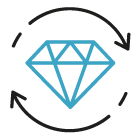
Adapt-Ability is not a process. It is a culture.
We have over 20 years expertise and experience in developing the mindset and abilities of people in organisations to be constantly seeking and delivering optimum performance … learning from experience and leading an improvement. It becomes the way people behave in all aspects of your business. We call it adaptive capability and it is the only sustainable advantage your organisation can have. We help you develop your adaptive capability by focussing on three primary abilities within your organisation:

Awareness
… is the ability to develop your organisation’s appetite for being innovative. John Kotter describes this as ‘creating a sense of urgency’. Awareness is developed not by pumping rational strategic change arguments into the organisation or training people in change process skills; but by acting on the knowledge that people will only promote change when the proposed future feels more appealing than the current status quo. Building a strong appetite for adaptation is the first critical step and it is primarily the responsibility of the senior leadership team.

LeadershiP
… is the ability of leaders at all levels to inspire their people to want to deliver change … to be adaptive. However comprehensive the corporate change strategy is; the disquieting reality is that the success of any corporate adaptation relies on the discretionary contribution of its employees. Unless people trust their leaders, feel inspired, rewarded and developed by them, they will withhold the ‘non-compulsory’ effort that is so essential to the successful implementation of strategy.

Learning
We are often amazed (actually horrified) how little corporate time is dedicated to learning. To clarify, learning is very different to training. In a stable, predictable environment ‘expertise’ (ie knowledge of what has worked well in the past) is highly valuable. In organisations experiencing high amounts of disruption too much value is often placed on the ‘expertise’ of consultants / managers / supervisors and consequently far too little time is spent at all levels – learning – asking: ‘What actually happened?’ ‘What can we learn?’ and crucially, ‘How do we do it better next time?’

